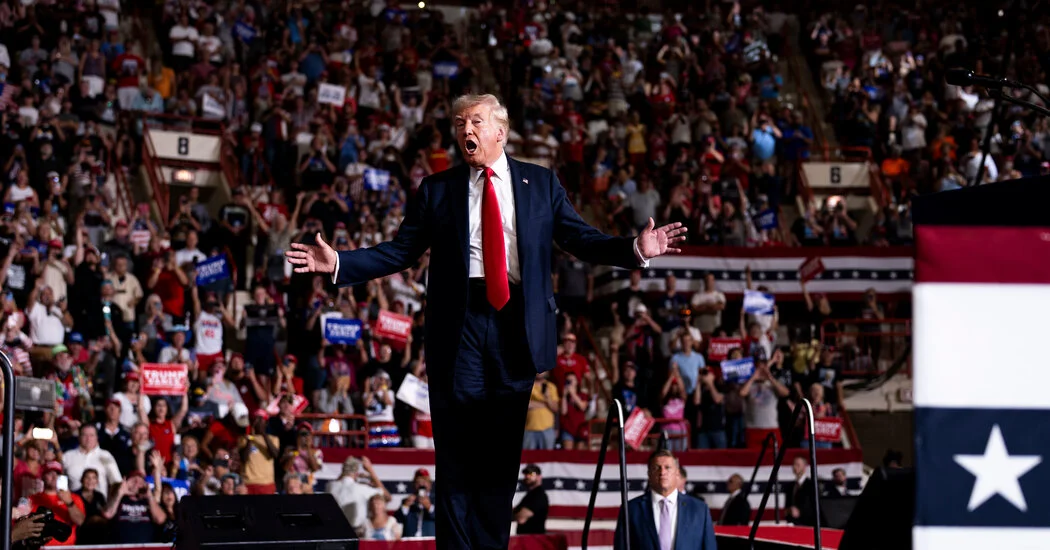NYT:
Trump Tries to Wrestle Back Attention at Mar-a-Lago News Conference
In an hourlong exchange with reporters, the former president criticized Vice President Kamala Harris for not doing the same, insulted her intelligence and boasted about the size of his rallies.
17m ago
Donald Trump stands behind a lectern in a gold-colored room. Four U.S. flags are behind him, and a group journalists stand in front of him.
Former President Donald J. Trump held a hastily scheduled news conference on Thursday at his Mar-a-Lago club in Florida.Doug Mills/The New York Times
Aug. 8, 2024Updated 5:56 p.m. ET
Sign up for the On Politics newsletter. Your guide to the 2024 elections.
Former President Donald J. Trump tried on Thursday to shoehorn himself back into a national conversation that Vice President Kamala Harris has dominated for more than two weeks, holding an hourlong news conference in which he assailed Ms. Harris’s intelligence and taunted her for failing to field questions similarly from journalists.
Throughout the event, held in the main room at Mar-a-Lago, his private club and home in Palm Beach, Fla., Mr. Trump assailed the state of the U.S. economy, described the country as in mortal danger if he did not win the presidential election and falsely described his departure from the White House — which was preceded by his refusal to concede his election loss in November 2020 and the violent attack on the Capitol on Jan. 6, 2021, by a mob of his supporters — as a “peaceful” transfer of power.
Mr. Trump also flashed frustration when asked about the size of Ms. Harris’s crowds while boasting about the attendance at his own rally on Jan. 6, 2021, and insisted that the group of hundreds that stormed the Capitol was relatively small. But he fixated on the size of the crowd that he initially gathered on the national mall, making comparisons to — and declaring it was larger than — the one drawn by Martin Luther King Jr. for his famous “I Have a Dream” speech.
“Nobody’s spoken to crowds bigger than me,” Mr. Trump said. “If you look at Martin Luther King, when he did his speech, his great speech, and you look at ours — same real estate, same everything, same number of people, if not — we had more.”
The Trump team has been looking for ways to interrupt Ms. Harris’s momentum as she has quickly consolidated the Democratic Party behind her and risen in the polls. The goal of Mr. Trump’s news conference, which he announced on Thursday morning on his social media site, was to highlight that Ms. Harris has yet to hold a news conference of her own or to give an unscripted interview to the news media.
It was a point he made during his event, arguing that she had avoided doing so because “she’s not smart enough.”
Mr. Trump insisted that he was “not complaining” about the Democratic Party’s late decision to replace President Biden atop the ticket — as he proceeded to lodge a litany of such complaints. He has called the move to replace Mr. Biden with Ms. Harris “unconstitutional,” but when challenged about what section of the U.S. Constitution would prohibit the change in the ticket, he acknowledged that perhaps it was not actually unconstitutional.
At the same time, he said that while the move was unfair to Mr. Biden, it had not affected his campaign. “I haven’t recalibrated strategy at all,” Mr. Trump said.
When a reporter asked about how muted his public schedule has been over the last few weeks, including this past week, Mr. Trump snapped, “What a stupid question.”
Mr. Trump is set to appear in Montana on Friday to help a Republican Senate candidate, Tim Sheehy, who is facing off against Senator Jon Tester in one of the election’s most competitive races.
“What are we doing right now?” Mr. Trump said, citing his schedule of radio interviews and adding of Ms. Harris, “She’s not doing a news conference.”
His wide-ranging remarks were sometimes meandering. Mr. Trump mused that the legal system was unfair to him, described the quick recovery of his ear after last month’s assassination attempt (“I’m a fast healer”) and defended the clemency grants he issued to violent felons and high-level drug dealers as president, when asked how they were different from his characterization of Ms. Harris’s time as a prosecutor in California.
Mr. Trump seemed most uncomfortable when asked specific questions about abortion policy — the issue he views as the biggest political danger for Republicans. He refused to say how he would vote on Florida’s abortion referendum in November, which asks whether voters will support a state constitutional amendment to protect and expand abortion rights.
Mr. Trump instead resorted to his go-to evasion, saying he would be holding a news conference at a later date to announce his position.
When asked if he would direct the Food and Drug Administration to revoke access to abortion pills, he seemed not to understand the question and provided an incoherent answer that did not address it.
“So, you can do things that will be, would supplement, absolutely. And those things are pretty open and humane,” Mr. Trump said. “But you have to be able to have a vote. And all I want to do is give everybody a vote. And the votes are taking place right now as we speak.”
Much of the news conference was consumed by familiar remarks. Mr. Trump laid out an apocalyptic vision of America under Democratic rule — focusing his attacks especially on the economy, crime and immigration.
He also promised that a depression on the scale of the Great Depression of the 1930s would result if Ms. Harris won election. This is also a recycled refrain, one that Mr. Trump used against Mr. Biden in the 2020 campaign.
Mr. Trump declined to elaborate on his comments last week, delivered to a group of Black journalists, in which he questioned Ms. Harris’s ethnicity.
Asked how he could claim, as he did to those journalists, that a woman who attended a historically Black university was only recently claiming to be Black, Mr. Trump said: “Well, you’ll have to ask her that question, because she’s the one that said it. I didn’t say it. So you’ll have to ask her. And I very much appreciate that question, but you’ll have to ask her.”
He added that she was “very disrespectful” to both aspects of her heritage, her Indian mother and her Jamaican father, without explaining what that meant.
But later he tiptoed toward identity politics as he described some of her appeal.
“She’s a woman,” he said. “She represents certain groups of people.”
Taylor Robinson contributed research.
Maggie Haberman is a senior political correspondent reporting on the 2024 presidential campaign, down ballot races across the country and the investigations into former President Donald J. Trump. More about Maggie Haberman
https://www.nytimes.com/2024/08/08/us/politics/trump-press-conference-mar-a-lago.html


